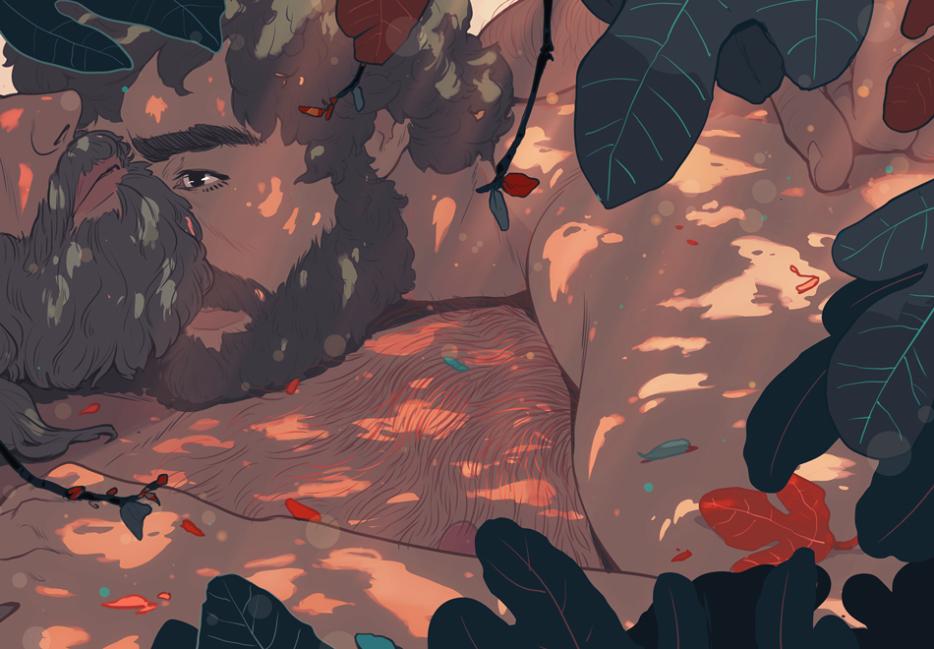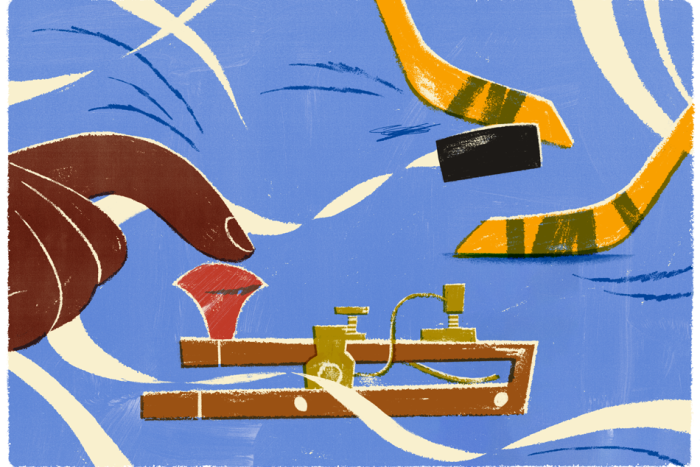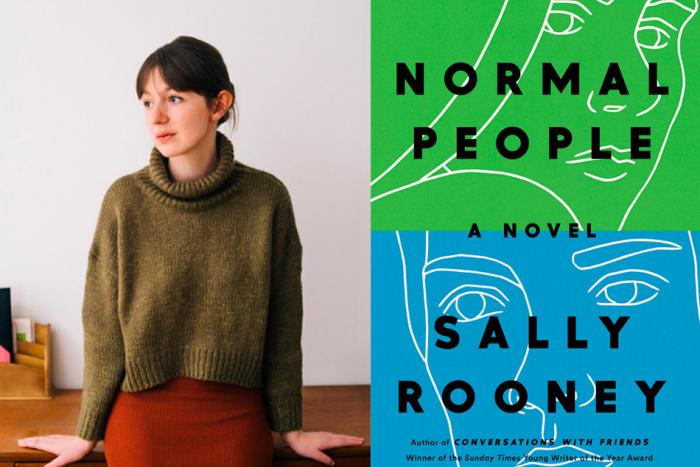In the beginning was the Word. And the Word was with God, and the Word was God. All things were made by him and through him; and without him was not any thing made that was made.
And the Word was life, and the life was the light of all. And the light is a light that shines in darkness, and the darkness comprehends it not.
And the Word spiraled outward into a cosmos of orbits and counter-orbits, into a billion subjectivities and a trillion perspectives. From the Word came a multiverse of matter and energy interfluxing, a dazzling, bewildering, volatile orrery, a wondrous, widening gyre: a going forth, to multiply.
And the Word became flesh: coarse hair, crooked smile, the taste of salt on his clavicle.
I am the disciple whom he loved.
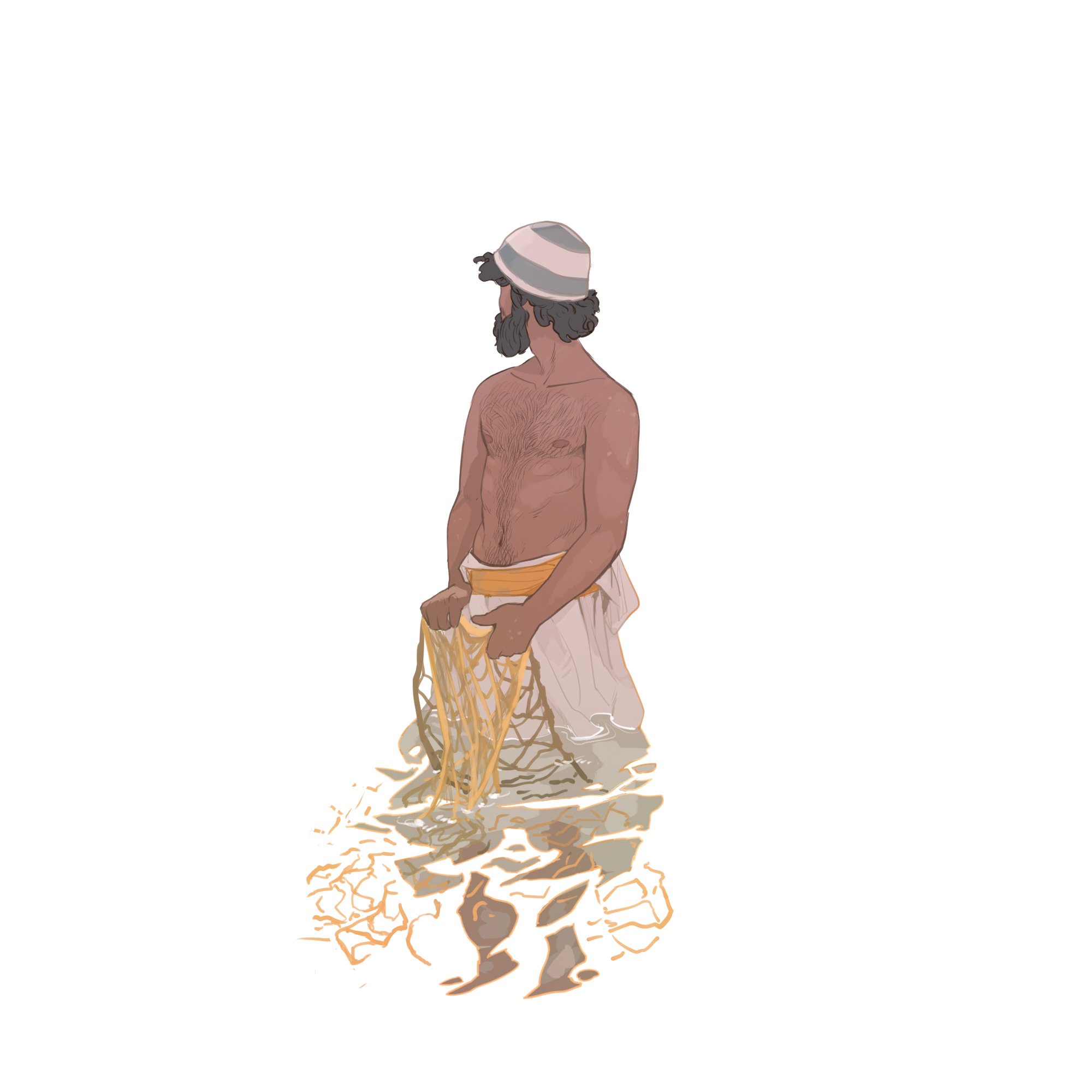
When I remember what came before, I see a black sky, a flash, and then hear a sound like the roar of rushing waters.
I lay sprawled in the tangle of rope thick and bristled in the stern of my father’s boat. The wood by now is dry, wherever its carcass is beached and whatever now scuttles there, but then it stank of its hundred hauls of ancient fish and its cedar hull that was busily sweating gum that matted the hair on my legs.
All day and into night we had caught nothing. And so half-dozing, I stared at a costive sky while my brother, stripped to the waist in the heat (but still wearing his silly hat, all the lanker for the atmosphere’s dense press) minded the net. He whistled a song of my mother’s. I remember her singing it, but not now its words. I remember her singing it, but not quite her voice.
I wasn’t there when my brother died. I am thankful for that. They sowed his bones in fields remote, to be seed against a harvest none of us will live to glean.
Instead I remember that sticky day before everything, seeing from prone the desperate throb of light stagger in zig-zag, and hearing my brother laugh as the humid summer air at last cracked open and drenched us cold and clean.
“Come and see!” and I saw: the whole sea’s skin rippling with the rain’s contusions, and beneath it a net swarming with silver life.
*
tell me a story
after that? aren’t you tired? didn’t you, I mean I thought—
no, I did.
obviously.
i touch his hand to the stickiness on his stomach, now growing cool and tacky in his hair
oh right. ok. um, In the beginning there was the
not that. a real one
…ok. ok. so. the night I was born there…there were a lot of animals. it doesn’t matter why
ok
ok. so there were doves in rafters high, and sheep with curly horn, and um, a cow all white and red and a donkey shaggy and brown
around a baby? where were you born in a
very funny. so it was cold, because it was winter—
wait
i open my eyes and pull my head away from the fuzz of his chest
when is your birthday?
mid spring, when the shepherds are in the field. that’ll be important later. listen; nevermind. it was cold, because it was christmas
he pushes my head back to his chest not altogether gently and starts to trace slow curlicues into the back of my hair
so i was shivering my baby ass off. so my mom asked the animals to help
what the fuck dude
i whisper, softly, into the pleasant stink of his armpit
listen—so the cow blew his breath all soft and warm
her breath
what?
cows are girls
oh. right. ok whatever. moooooooo. cattle lowing, all that good stuff. so I blessed the cow
sure
but the fucking donkey is all “eyy-onh, eyy-onh.” super cold whinnying. you know, like donkeys do.
do donkeys do that?
of course they do that. haven’t you met a donkey
i mean, i guess. i mostly fished
so I go up to the donkey—
as a baby?
so i go up to the donkey. and I say, “what’s your name?” but he just keeps going eyyy-onh, eyy-onh all cold. so I pull his ears wayyyyy up and say, “your name is DONKEY.”
And that’s why donkeys have long ears. It might also be why mules are infertile; I might be confusing the details, and it might be funnier in Portuguese.
i roll away from his side and out along the length of his arm, to bring my face to rest inside his open hand, and stare out into the darkness beyond our little light.
let me get this straight. donkeys didn’t have long ears until you, as a baby, punished them for breathing on you too coldly?
i mean…
I am the Way the Truth and the Light. the infinite utterance which speaks all being into being and so am unbound by the laws of cause and effect, chronology and chemistry, space and time, so…
why did all the donkeys have to be punished for that one donkey
who was only doing what you made him to do?
dude, that is kind of my whole deal
is that a true story?
of course it is. I am the Way, the Truth, and the—
did that really happen
oh. no.
this bedtime story sucks.
tell me a better one.
*
I remember the day he came to my brother and me, on the shore as we knelt untying my father’s skiff. Rosy-fingered Dawn was unstitching Night’s design, and then: there he was.
In the flesh.
Come with me, he said, reaching out a hand that in the years, short years, to come I would kiss until I knew its every callous and curve.
Until the Romans broke it, as they break everything, and left it a mangled pulp for us to scrape from their torture post. Until the angels made it incorruptible and a beneficent sign for all to see. Until both left it perfect and golden and alien and unrecognizable to me.
How can you follow anything, he said, if you are down upon your knees? Get up and walk. We have work down the road.
What could I do but follow straight?
We never saw the boat again.
*
One time he got really fucking furious at a fig tree.
Just absolutely screamed at it for like forty-five minutes.
*
From silence speaks the light. In the beginning was the Word.
The symptom of language then is reality; we speak these stories and these stories speak us over and over until I am not sure if we are anything but history indulging a bad habit.
We are the atoms of history: dust that has gathered on sandals. And dust upon sandals, and dust upon the road—who knows the revolutions of dust?
My mind is not what it was. Let me try again.
*
Incarnation means nothing more than in the meat, and it was the meat of him I loved—red and raw, the stinking sweating heft of him
*
A father commanded his two sons to work in the vineyard.
“Yes father,” said one, but did not go.
“No father,” said the other, but he went.
Which of these, then, has done his father’s will?
I thought, when he asked, that I knew. But I was young then. And now I am old, old as he never was nor ever will be, and I know now that love sometimes makes a promise it cannot keep, and sometimes no toil can fix the clockwork of a heart dropped from the mantle smearing glass across the floor.
Sometimes you must say “yes” when you mean “no.” There is a kindness that he never learned in the lie.
*
ok a story
once upon a time a nun on an important mission was crossing a river with her donkey laden with supplies.
and the beast stumbled, and it sent all her goods, her clothes, her books, tumbling into the stream.
and as she tried to recover her ruined things I appeared on a rock, and I said, “that, teresa”—because her name was teresa—“is how I treat all my friends.”
“and that, lord,” she said, “is why you have so few of them.”
that story also is not very nice. and it’s kind of the same story as the donkey one
yes
they all are. the same story
*
He sits in a house cool and dark as the mob presses in. From my post amid the knit of the crowd outside I hear the scratch of his barked laugh tumbling over their bodies like a brook breaking over thirsty stone. A twinge of jealousy dances over my ribs for a second, and is gone.
A street away there is a bustle. Men, square and strong, with a beauty that is familiar and a cruelty that is not, are moving through the press, entitled and rough. With them is a woman, older but not old, who watches the crowd part like she is afraid, but not for herself, and not quite of them.
From her scarf falls a serpent-coil of hair and I suddenly understand why I know and do not know the features of the young men jostling on her behalf; and I know, not just from the lock of unmistakable tawny brown but from the precise nervous choreography of her sudden gesture to tuck it back behind her ear. I know, with an electric, genetic certainty: this is his mother.
She stares at me as she waits outside, while what looks to be the oldest of these men barks into the house, barks with a bark so much like his, with a bravado I will get to know in later years is slightly shrill to mask this man’s nerves.
James was my brother’s name, too.
In reply from inside the house, I hear the burble of his voice, its words indistinct, and a laugh cascade lazily again through the crowd. He will not see her.
In front of me their mother’s eyes are still staring, glassing now, and I feel the heat in my cheeks, the embarrassment he never seems to have the decency to feel, that has left me a raw nerve and forever seeping apologies in his wake. But today, for her, I have none. How could I. How could he.
And I know: this is how he will leave me too. A swift, cruel blow that will shatter all my bulk. A surgical strike from above, hurling masonry through the streets like leaves of concrete. I will scream, desperate in the temple precincts, looking for a lost boy I had mistook for kind, who will laugh at my panic: didn’t I know he should be with his father?
And the learned and the holy will praise his wit, and his insight, and the bravery with which he left us behind.
He will skewer steel through the raw pulsing meat of my heart, to wild acclaim.
I watch his brothers swear and push their way back out of the crowd, the sweat darkening their shirts. She glances once, hopefully, over their broad desultory backs shaped so much like his, and I realize I recognize their cruelty after all.
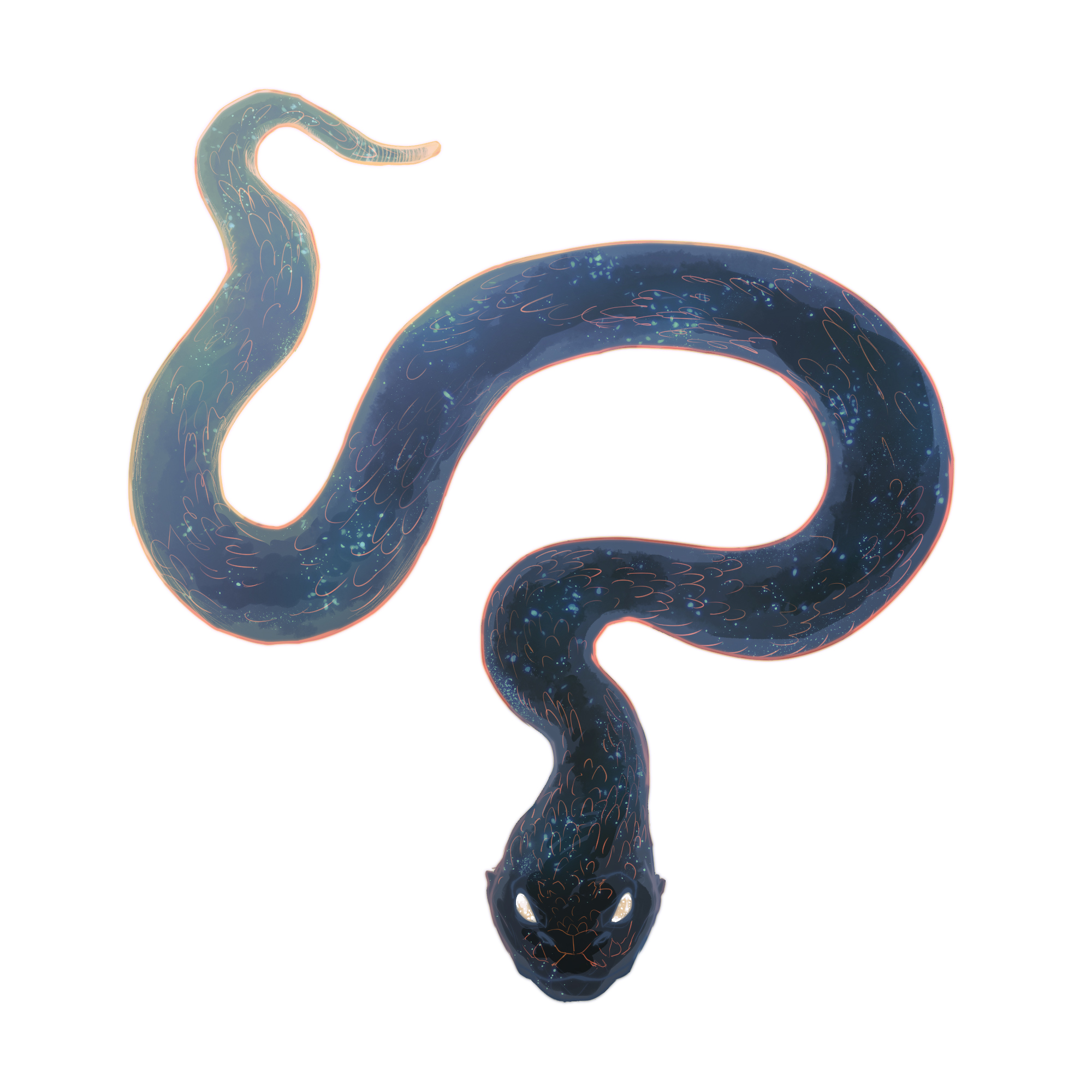
From my house at Patmos I see a serpent blot out a third of the stars, belched hot from ruined Hell to gnaw at the root of a world suspended from a golden chain, and dragging behind him the debris of a universe of death.
And as the light from our world hits his scaly skin I wonder how it feels against his scars.
He and I both know what it is to outlive our allotted grace.
He and I both know what it is to slither over cracking stone in a wilderness grown parched and seasonless.
Our God has made monsters of us both.
Our God has made us witness to his glory, and dared us to cry out while he ripped the thing we love apart before our eyes.
And I watch the Great Serpent who is called Satan make planetfall and drop to crawl through the underbrush and hot dirt, with a brand of hot fire in his tail, side-winding through a world of kindling.
And I go back inside.
The death of God might have been endurable if he had not then plunged his corpse into the well and poisoned all the earth with wormwood.
So let this dead sphere bury its own dead. Tear out the eye that makes you sin. Shake off the dust from off your sandals. Tear down the Temple; build a new one.
He always hated nostalgia. It’s what I remember most fondly.
*
wake up
please wake up
The grass is cool and damp from the night air and the broad flat carpenter pads of his hand are smoothing my hair too roughly. I fell asleep.
When did I fall asleep?
His nose against my face is slick. A dog, pawing, whimpering. Even in the dark i can see his eyes are wild and wet and his brow soaked and chilled. Through the slit of my white sindon my baffled, dozy erection nudges, which he is cupping desperately and absently. I sleepily try to pull him down to me before I process something is wrong.
listen
nearby peter’s snores rumble the stone while my brother sleeps face-up, open-mouthed, gulping lazily like a dying trawl. His hand tightens gently and then I hear it: a troop of men, clanking and cursing, are coming up the garden path.
what if we ran
yes we could run. we would lose peter i would lose my brother but i have lost everything for him before lost mother and father and town the children and wife and dignity i will never have and i cannot care—just dust on the road behind us
what would it profit a man to lose his soul just to save some petty world
but suddenly there is light everywhere as torches catch the vicious crags of faces. There is a boot in my gut and i am hauled from the turf.
“which of these faggots is it?” they throw the sniveling little crabapple traitor into the ash around our cold fire and he scrambles and sobs and clutches at his master’s cheek mewling his apologies and frantic slobbered kisses
with a rage i did not know i had i throw him again to the ground and their arms are everywhere on me but the linen is loose their armor is heavy and on him they have not yet even laid a finger and suddenly peter is awake and roaring, brandishing a sword i did not know he had the sense to carry
“we run,” i whisper to him while peter holds their attention, sliding from my sleeves, his forehead to mine. “if they kill us they kill us but we run now”
in his eyes i see the light that lit the stars the dark that sat brooding upon the waters and
i have loved you more than i have loved anything. you can’t forget.
Never. Never. the whole of my life before and since I have broken every promise I ever made so that I might more perfectly serve that one.
and so i bolt, wriggling from the white robe in the soldier’s hands, slipping from the net like a flash of living mercury. naked and shining under a scudding, lambent moon and laughing, to be so free
(at least st ambrose believed it was me)
*
But when I turn breathless on the hilltop, he is not with me. Instead there he stands rooted, right where i left him, stalwart and righteous as a Goya by their torchlight. Still not a hand upon him.
Not a man had followed. No one had cared.
And i crumble, naked in the grass, and weep til morning light
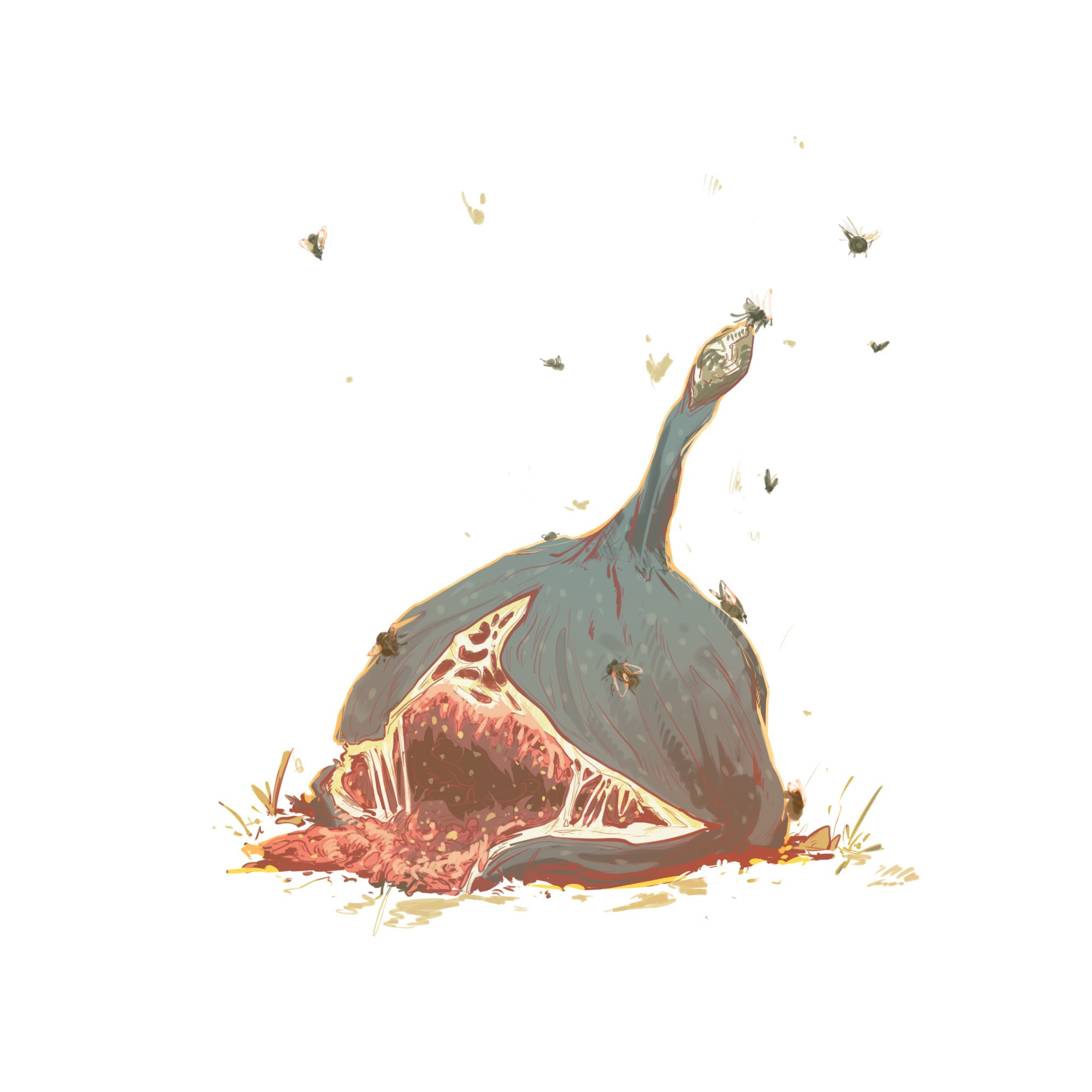
when i wake again it is morning and the sun is hot. nearby from a tree hangs the traitor, the cord of his belt around his neck, his expression an ugly scarlet bloat. Upon his brow is a wound i might well have given him. Soon his blotching face will split like sweet rotting fruit and the birds of the tree are inquisitive but not yet brave enough to feast.
i take his piss-stained clothes and stumble into town to watch the world end.
*
still i keep my testament
and so i am supposed to write. supposed to claw into the rock of history some phrase that will last when I am dead and gone and though all the world cannot conjure the contours of my face it will remember the flinty brilliance that I sparked here in the dark alone and the rock of his majesty against which i struck that light
but my heart is so broken.
broken is not even right. it is a pulverized thing. a bruised uncabled tissue, its fibers relaxed and purpling with pooling, cooling curdling blood. fruit rotting to succulence
when i sleep i remember days that never were. i dream a life i never saw and which i now see he never wanted
did you not know i would be in my father’s house?
he left, and i do not know what now becomes of me
we are supposed to endure. but the truth of history—the real fact of the record—is that some lives do not matter once they’ve passed out of them
we live, but we live in the footnote
how is it that they could kill him but i am what died
writing does not heal. the document does not make whole. poesis is not a therapy it is thrusting a filthy digit into the spot where the lance has pierced you and it says:
look, here. ascend and transcend all you like; this is the wound that will not close.
this is the precise spot
you have been marred forever
*
i watch them drive a rivet through a foot that i kissed i know not how oft
feet i cooled and washed with my own hair: the delicate, beautiful ball of his ankle, swooping to curve down into ridges dusted with errant tufts of hair, a faint sourness from leather and grit and the thoughtless joy with which he walked and ran and even once danced, scooping me up in his arms in a nighttime waltz in an upper room when all the world was asleep and there was no music but my jackhammering chest and i asked him in a child’s whisper to draw shut a window-curtain lest the neighbours see and which to my secret thrill he did not
smashed and ruined and unmade
*
so why do you hate donkeys so much
i don’t hate donkeys.
he is playing with my fingers, dandling them in the space above our heads, as dust-motes plays in the light
i love donkeys.
they try,
and they fail.
donkeys are cute, and they do their best, and they end up hobbled, maimed, broken in a stream
every day a stress test, til breakdown.
to be a donkey is to know the truth:
God always gives us more than we can handle.
he presses my finger into the centre of his hand.
ok. well, I like the nun.
i thought you would.
good night.
and he kisses me on the forehead, and in his arms I dream of the smell of hay and the breath of beasts


